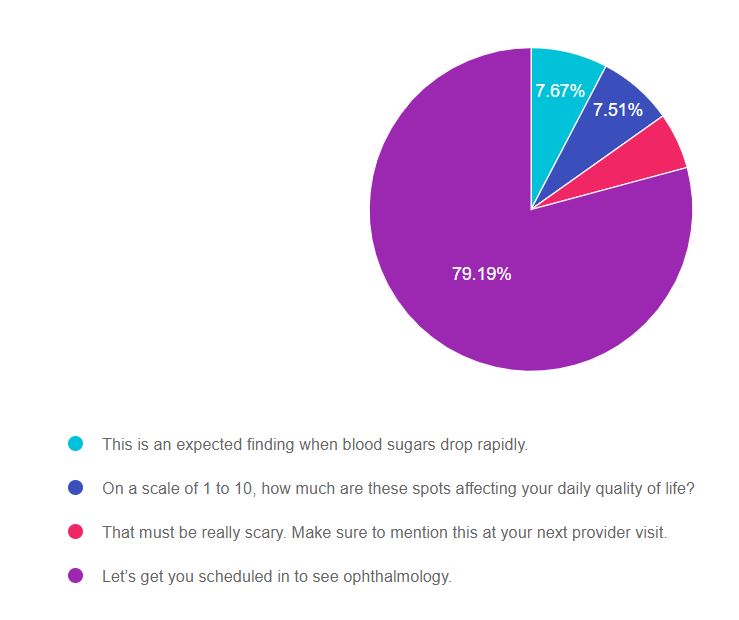
For our March 30th Question of the Week, 79% of respondents chose the best answer. We wanted to “take a closer look” into this question. What is the best action to take for some one who is experiencing eye issues?
Before we start though, if you don’t want any spoilers and haven’t tried the question yet, you can answer below: Answer Question
Question: JR was recently diagnosed with type two diabetes. JR‘s A1 C was 13.9%, but now blood sugars are running in the 100 to 180 range. JR mentions that they have been noticing “black spots” floating in their eyes.
What is the best response by the diabetes specialist?
Answer Choices:
- This is an expected finding when blood sugars drop rapidly.
- On a scale of 1 to 10, how much are these spots affecting your daily quality of life?
- That must be really scary. Make sure to mention this at your next provider visit.
- Let’s get you scheduled in to see ophthalmology.

As shown above, the most common choice was option 4, the second most common answer was option 1, then option 2, and finally option 3.
Getting to the Best Answer
If you are thinking about taking the certification exam, the content of this practice test question will set you up for success. The exam will present questions that require test takers to make sure the answer matches the ADA Standards of Care and best clinical practice.
Answers & Rationale
Answer 1 is incorrect, 7.67% chose this answer, “This is an expected finding when blood sugars drop rapidly.” Actually, this is not an expected finding and warrants immediate investigation.
When people with diabetes experience fluctuations in blood sugars, they may complain of blurry vision and their glasses not working due to fluid shifts. However, a rapid drop in glucose can intensify the risk of retinal bleeds. “Black dots” or floaters can indicate retinal bleeding and warrant an immediate evaluation by an eye professional (Ophthalmologist or Optometrist). Delayed treatment can lead to serious eye problems.
Answer 2 is incorrect, 7.51% of you chose this answer, “On a scale of 1 to 10, how much are these spots affecting your daily quality of life?” This assessment question would be appropriate if the person was receiving treatment for eye problems already and we are evaluating the impact on daily life. However, this is not the case.
This sudden appearance of black dots” or floaters can indicate retinal bleeding and warrant an immediate evaluation by an eye professional (Ophthalmologist or Optometrist). Delayed treatment can lead to serious eye problems.
Answer 3 is incorrect, 5.63% of you chose this answer, “That must be really scary. Make sure to mention this at your next provider visit.” Yes, it is important to notify the provider, IMMEDIATELY. What if the next provider visit is in 6 months or a year? What if JR misses that appointment and gets lost to follow-up?
This sudden appearance of black dots” or floaters can indicate retinal bleeding and warrant an immediate evaluation by an eye professional (Ophthalmologist or Optometrist). Delayed treatment can lead to serious eye problems.
Answer 4 is correct, 79.19% of you chose this answer, “Let’s get you scheduled in to see ophthalmology.” GREAT JOB. Most of you chose this answer. This sudden appearance of black dots” or floaters can indicate retinal bleeding and warrant an immediate evaluation by an eye professional (Ophthalmologist or Optometrist). Delayed treatment can lead to serious eye problems and many people with diabetes don’t receive regular eye care. Let’s help break down barriers and make sure people with diabetes get the eye care they deserve.
We hope you appreciate this week’s rationale! Thank you so much for taking the time to answer our Question of the Week and participate in this fun learning activity!
Sign up for Diabetes Blog Bytes – we post one daily Blog Byte from Monday to Friday. And of course, Tuesday is our Question of the Week. It’s Informative and FREE! Sign up below!
[yikes-mailchimp form=”1″]Accreditation: Diabetes Education Services is an approved provider by the California Board of Registered Nursing, Provider 12640, and Commission on Dietetic Registration (CDR), Provider DI002. Since these programs are approved by the CDR it satisfies the CE requirements for the CDCES regardless of your profession.*
The use of DES products does not guarantee the successful passage of the CDCES exam. CBDCE does not endorse any preparatory or review materials for the CDCES exam, except for those published by CBDCE.








